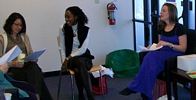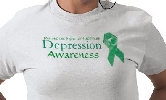Jeanette had a bad case of low self-esteem. Even when she was a child, all her teachers wondered how this could possibly be. She was smart andmusically gifted, but had absolutely no confidence. She never tried out for the orchestra or school plays. As she got older, this pattern continued, and she ended up with minimal jobs that didn’t come close to tapping her native talents. She just assumed that she wouldn’t amount to anything. Every time she had an inclination to reach out and try something challenging, she got a sinking feeling in her chest and gave up on the idea.
One afternoon Jeanette’s friend Lynn was having a very bad day; she complained to Jeanette of heaviness in her heart. Lynn was talking about a critical voice that she heard inside of her. Suddenly something clicked inside Jeanette’s mind; she realized that she recognized the voice her friend was describing. It lived inside her, too! It was saying critical things like: “You aren’t any good. You can’t do it. Don’t even try.” She had always just assumed that this wasthe truthabout her. She had never viewed these harmful messages as coming from a separate part of her psyche. She recalled how she would long to try out for a play but this other voice spoke so forcefully that she didn’t dare.
This was Jeannette’s Inner Critic. Since she hadn’t been consciously aware of it until that moment, she had no way to communicate with the Critic. She saw no way to confront the source of her negative beliefs about herself.
When Jeanette became aware of how it was tearing her down and ruining her life, she got very angry at her Inner Critic and wanted to get rid of it. If she had turned to conventional therapy, she might have been encouraged to ignore it or overcome it. She would have seen it as the enemy. However this isn’t very effective; when we battle with the Inner Critic, it just becomes more entrenched.
Using the Internal Family Systems Therapy (IFS) approach, Jeanette explored her own psyche and gradually got to know her Inner Critic. To her amazement, she discovered that this part was actually trying tohelpher. Even though it was causing hopelessness and depression, it was doing this in a distorted attempt to protect her. It wanted to keep her safe from failure and humiliation, and it figured that the best way to do this was to prevent her from ever trying anything difficult. It accomplished this by constantly judging and discouraging her. Once Jeanette realized that her Critic was trying to help her, her anger melted and she began to understand, befriend and treat it more kindly. Over time, Jeanette’s relationship with her Critic softened and became less harsh.
When Jeanette explored further using IFS, she discovered that there was another part of her that was receiving these messages from the Critic. This part believed these judgments and felt worthless, defeated, and hopeless. We call this part theCriticized Child. Jeanette realized that she could become a friend to this unhappy child and connect with it from a place of love and compassion.
Then, using the IFS procedure, she accessed those childhood memories that were the origin of her Inner Critic. Those memories had caused her to feel judged and dismissed and made to feel worthless. The Criticized Child is the part that was hurt by those judgments. Jeanette then healed this Child through her love and helped it to release feelings of shame and worthlessness. Her Critic then receded into the background and caused her less trouble.
In addition, as a result of this work, Jeanette discovered a helpful part, one that we call theInner Champion. This part has the capacity to support and encourage us in the face of Inner Critic attacks. Jeanette was able to develop and strengthen this caring part that only wanted the best for her. Her Inner Champion told her that she has a lot of talent and could accomplish great things in the world. She learned to evoke it when necessary and take in its support.
Her Champion said, “You are OK just the way you are. You can do it. I'm proud of you.” This helped Jeanette to take the risk to develop her musical talent and try out for performing positions. At long last, she moved ahead professionally in a career that she really loved. As her Inner Champion took over for her Inner Critic, she became more self-confident, happier, and confident enough to pursue her dreams.



